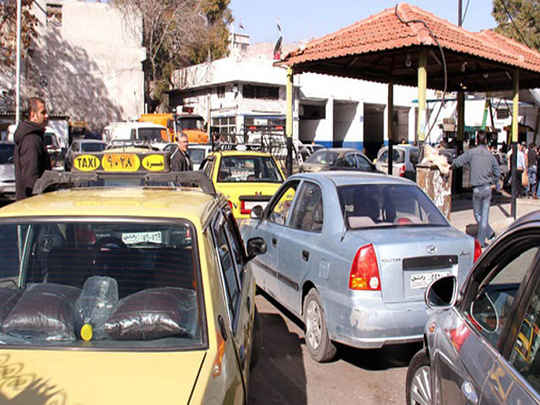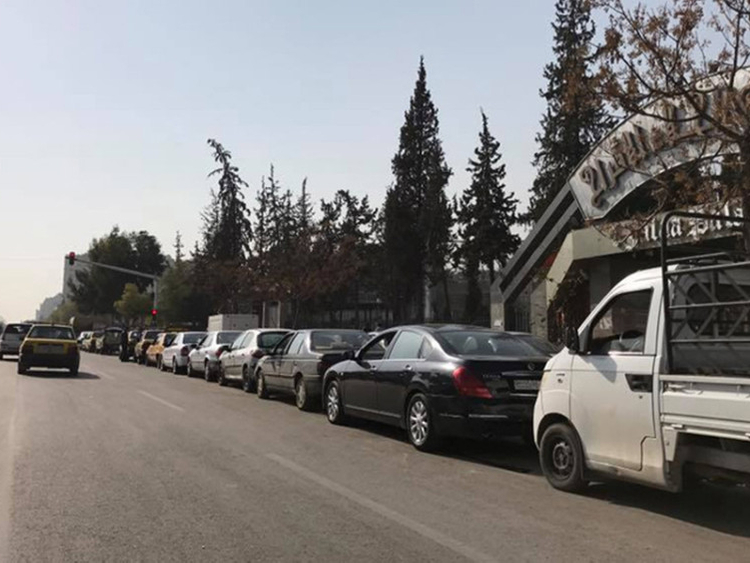
Damascus: “Two burgers and a large Coke.”
“Can you give me an address Sir?”
“The blue Mazda facing the Mezzeh Gas Station, License Plate #3-X-0928; you brought us lunch yesterday but we have advanced a few metres since.”
This is one of the many jokes circulating on Whatssapp in Damascus, making light of a dire gas shortage the capital has been facing as of late.
Long queues have obstructed traffic in the city since the crisis started on February 7, as all but three gas stations have shut down, and so have most public transport buses, due to the worst gasoline shortage in the city’s history.
Abu Haitham, a cab driver in Damascus, told Gulf News: “I waited for six hours to fill up my car. I arrived at 6:00pm and left the gas station at midnight.”
Others have not been that lucky, spending the entire night waiting for fuel, and when their turn finally came up, were shocked to see attendants waving their hands saying, “Finished. No more! We are sorry.”
In the once posh district of Mezzah, southwest of central Damascus and previously home of foreign diplomats and several embassies, armed men are standing at the only remaining gas station, located near the Cancer Hospital, trying to regulate traffic.
One method was to rotate entry into the gas station; Mondays for odd number license plates, Tuesdays for even number plates, but that didn’t work — due to the high number of cars that came to be filled and refused to go away, driven by men with guns.
In the coastal city of Tartous, where militias are armed to the teeth, gun battles have been reported at gas stations over the past three days.
One witness told Gulf News: “A bearded man wearing camouflage fatigues, drove up in a black tinted-window Lancer. He tried breaking into the line, waving his firearm to scare people away. When the soldiers tried to stop him, he started shooting at them.”
Before the crisis started in 2011, state-subsidised gasoline used to sell for 50 SP/litre ($1.0 USD) and was always available.
Although still subsidised by the government its price has now been raised by 450% and currently sells for 225 SP/litre.
This is less expensive if measured against foreign currency, due to devaluation of the Syrian pound, but astronomical for people making their income in Syrian currency.
Due to gripping fuel shortage, entering its second week today, gasoline smuggling has started from Lebanon, resulting in a black market price of 500 SP/litre.
Randa Atta, who teaches 3rd grade students at a state-run elementary school in al-Midan, told Gulf News: “My salary, with its bonus and all its perks, can reach up to 50,000 SP monthly ($100 USD). Filling up my car once a month eats up 50% of what I make — I would prefer feeding my children instead. I haven’t used my car in two months. I go to work walking or using public transport — but even those horrible buses are now out-of-service.”
To shoulder the enormous crisis, which has created waves of unrest in government-held cities like Latakia on the Syrian coast and the capital Damascus, Prime Minister Emad Khamis issued legislation forcing the public sector to reduce its consumption of gasoline by 50%, excluding only state-run hospitals from the decree, and vehicles operating with the Ministry of Defense.
Another order was issued earlier this week aimed at rationing gasoline at the few operating gas stations, instructed to refuse filling any automobile with more than 25 litres daily. The government claims that the consumption of gasoline costs 4 billion SP per day, the lion’s share of which goes to Damascus, a city consumes 1 million litres of gasoline per day.
A government official who spoke on the condition of anonymity to Gulf News, confessed saying: “One of our problems are the cities and towns that we have recently re-entered, like Aleppo (which was retaken by government forces last December). Running them from scratch is costing a fortune. Previously, our gasoline used to satisfy the needs of only four cities; Damascus, Tartous, Homs, and Hama. Suddenly we find ourselves having to provide water, fuel, and electricity to places like Aleppo. We need to show residents of these liberated cities that after four years of absence, the government can still deliver the basic necessities of life. As a result, we have been falling back when it comes to places like Damascus.”
The crisis has temporarily been solved, he adds, as a fuel tanker unlocks in the port city of Banias, carrying 11 million tons of fuel to Damascus.
The gasoline shortage comes at the heels of a gripping water shortage, which gripped Damascus for one month between late December and early January.
Due to ongoing battles in the Damascus countryside village of Ain Al Fijeh, which houses the main spring that brings fresh drinking water to Damascus, the city’s water supply was cut off and some of its water pumps were destroyed. No sooner was that solved, after the rebels of Ain Al Fijeh surrendered, than a major electricity problem erupted in Damascus, due to an exceptionally harsh winter that aggravated people’s reliance on heating fuel, resulting in a rationing program by the Ministry of Electricity that cut off power for five hours, restored it for one, only it off again for another five hours, repeating the process throughout the day.
Still, some people are managing to get a good laugh out of their misery, with online jokes and videos.
One clip going viral on social media is of a 1978 play by Syrian comedian Duraid Lahham, who celebrates being given the electric chair in prison, telling his jailer: “Electricity has reached my rear end before reaching my village!”
Elsewhere, one flower-shop in Damascus has put an empty red gallon on display for Valentine’s Day, encouraging shoppers to present their loved ones with a gallon of gasoline — instead of chocolates and teddy bears.













